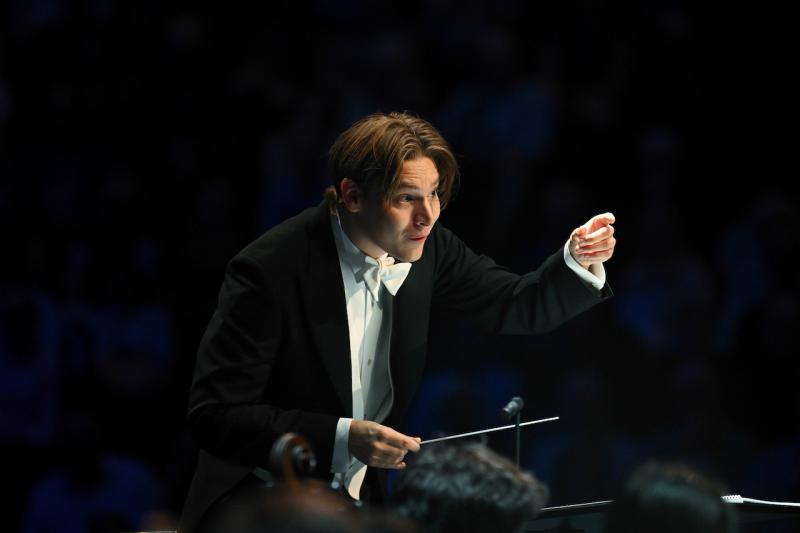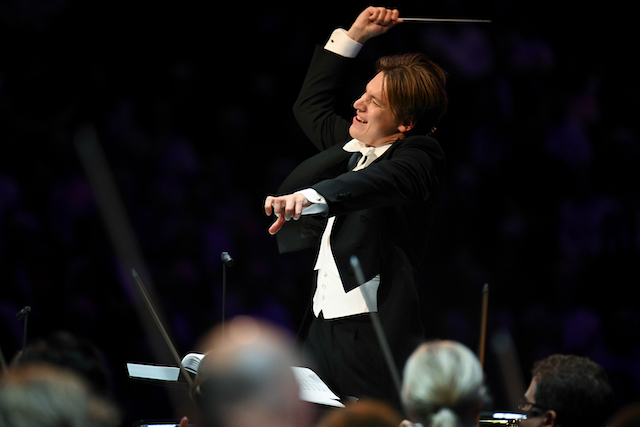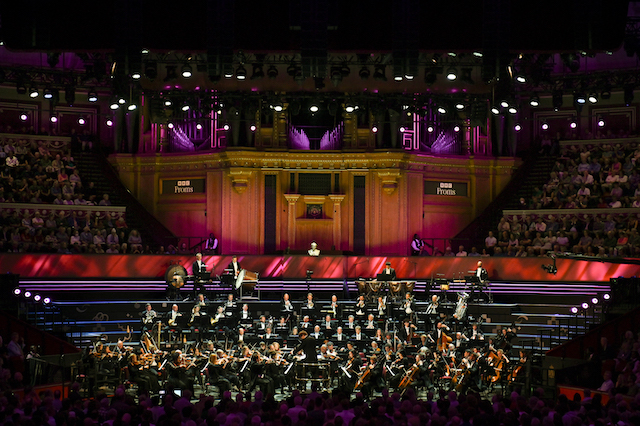BBC Proms: Royal Concertgebouw Orchestra, Mäkelä review - defiantly introverted Mahler 5 gives food for thought | reviews, news & interviews
BBC Proms: Royal Concertgebouw Orchestra, Mäkelä review - defiantly introverted Mahler 5 gives food for thought
BBC Proms: Royal Concertgebouw Orchestra, Mäkelä review - defiantly introverted Mahler 5 gives food for thought
Chief Conductor in Waiting has supple, nuanced chemistry with a great orchestra

Klaus Mäkelä teased out all the fragility and the sense of impending mortality in Mahler’s Fifth Symphony, revealing a vision that was as intricate as it was quietly luminous. Famously Mahler almost died from an intestinal haemorrhage in the year that he started composing the work, and the Royal Concertgebouw Orchestra’s sensitive, nuanced performance conveyed his heightened awareness of a world that could suddenly disappear without warning.
Mäkelä will become Chief Conductor of the Royal Concertgebouw Orchestra in 2027, and this performance was a good demonstration of the supple intimacy that has already developed between him and the performers. His interpretation of this symphony was criticised when it played in Salzburg for being “depressing”, yet while it certainly resisted the swooning emotional highs – not least in the Adagietto – it created a convincing portrait of a composer painstakingly piecing his life back together.
The renowned trumpet opening – infamously echoing the start of Beethoven’s Fifth Symphony – was as fresh and free as a bird taking wing at dawn. Yet the beat of the bass drum was like a fragile heartbeat. While there was a fluid old world charm and delicacy to the elegiac theme taken up by the strings, gradually evolving into a sense of carnivalesque chaos, each time the drum played we were reminded that everything hinged on this pulse.
 The storm of the second movement broke as if it were somewhere in the distance, a remote swirl of thorny agitation that found focus as the cellos began their weeping lament. As the brass section reasserted its dominance, once more the chaos and darkness took over, but this felt less like an external storm than a crisis of the soul, a darkly internal struggle that slowly fizzled out, ending with a solitary melancholy drum beat.
The storm of the second movement broke as if it were somewhere in the distance, a remote swirl of thorny agitation that found focus as the cellos began their weeping lament. As the brass section reasserted its dominance, once more the chaos and darkness took over, but this felt less like an external storm than a crisis of the soul, a darkly internal struggle that slowly fizzled out, ending with a solitary melancholy drum beat.
The mood became more optimistic in the third movement – the first movement of the symphony that Mahler completed – beginning with a volley of horns and whirling into a series of dances in three time. Yet while there was a gleeful energy to the dances, there was an evanescent quality to them too, as if they were being performed by ghosts or figures on a magic lantern. Each time the horns – wonderfully led by Katey Woolley and Laurence Woudenberg – sounded out, it was like a summons from another dimension.
The Adagietto – considered by many to be a love song without words to Mahler’s wife Alma – was in many ways the most striking movement because of the way Mäkelä so studiously avoided any excess of emotion. There were no tears or palpitations here, more a sense of quiet wonder, as if the composer were sitting in a field at sunrise, observing the delicate details of the grass blades, flowers and morning dew.
The solo horn summoned us to action once more for the final movement, with the oboes and clarinets calling out to each other like birds marking their territory. Yet even as the intensity built, the overwhelming feeling was of a composer whose life had fractured, who was slowly putting the jigsaw pieces of his thoughts and emotions back together. I found this intellectually fascinating – and watching Mäkelä’s deft dance-like movements as he conducted the orchestra – the chemistry and trust between him and the musicians was clear. I wouldn’t agree with the other critic’s verdict of “depressing”, but it was a defiantly introverted interpretation that gave much food for thought, even if it might not end up being your first choice on Spotify.
 Maybe this gossamer-fine approach was in part due to the influence of experimental Italian composer Luciano Berio, whose response to Schubert’s Unfinished Symphony in D major (as distinct from the famous Unfinished Symphony in B minor) opened the evening’s concert. In Rendering, composed between 1988 and 1990, Berio’s assertively unscholarly approach involved filling in the gaps that Schubert left in the music with what he called “connective tissue” or “cement”. To do Berio justice, it never felt as if we were listening to cement, but there was often a sense of being drawn into a hallucinogenic, faintly disturbing sound world. Fragments of Schubert’s music were interspersed with otherworldly passages heightened by the ethereal bell-like celesta.
Maybe this gossamer-fine approach was in part due to the influence of experimental Italian composer Luciano Berio, whose response to Schubert’s Unfinished Symphony in D major (as distinct from the famous Unfinished Symphony in B minor) opened the evening’s concert. In Rendering, composed between 1988 and 1990, Berio’s assertively unscholarly approach involved filling in the gaps that Schubert left in the music with what he called “connective tissue” or “cement”. To do Berio justice, it never felt as if we were listening to cement, but there was often a sense of being drawn into a hallucinogenic, faintly disturbing sound world. Fragments of Schubert’s music were interspersed with otherworldly passages heightened by the ethereal bell-like celesta.
The Allegro movement opened with a murmuration of subtle, shifting sound, which was soon augmented by the sweetness of the flutes. Then the celesta introduced its eery tones, succeeded by the muted brass section hinting at something more ominous beneath the surface. In the Andante movement the ravishing oboe solos seemed briefly to make time stop before we stumbled once more into the dreamscape. Then the Scherzo, with its elaborate counterpoint, lifted us briefly into a dance before more ethereal forces took over again.
Overall this was an evening that was as disconcerting as it was inventive, deliberately taking the audience down a path of introversion and confusion. It will be interesting to see if Mäkelä is saving a more vivid palette of orchestral colour for his second Proms concert this year of Mozart, Prokofiev and Bartok.
rating
Share this article
The future of Arts Journalism
You can stop theartsdesk.com closing!
We urgently need financing to survive. Our fundraising drive has thus far raised £49,000 but we need to reach £100,000 or we will be forced to close. Please contribute here: https://gofund.me/c3f6033d
And if you can forward this information to anyone who might assist, we’d be grateful.

Subscribe to theartsdesk.com
Thank you for continuing to read our work on theartsdesk.com. For unlimited access to every article in its entirety, including our archive of more than 15,000 pieces, we're asking for £5 per month or £40 per year. We feel it's a very good deal, and hope you do too.
To take a subscription now simply click here.
And if you're looking for that extra gift for a friend or family member, why not treat them to a theartsdesk.com gift subscription?
more Classical music
 BBC Proms: Royal Concertgebouw Orchestra, Mäkelä review - defiantly introverted Mahler 5 gives food for thought
Chief Conductor in Waiting has supple, nuanced chemistry with a great orchestra
BBC Proms: Royal Concertgebouw Orchestra, Mäkelä review - defiantly introverted Mahler 5 gives food for thought
Chief Conductor in Waiting has supple, nuanced chemistry with a great orchestra
 Dunedin Consort, Butt / D’Angelo, Muñoz, Edinburgh International Festival 2025 review - tedious Handel, directionless song recital
Ho-hum 'comic' cantata, and a song recital needing more than a beautiful voice
Dunedin Consort, Butt / D’Angelo, Muñoz, Edinburgh International Festival 2025 review - tedious Handel, directionless song recital
Ho-hum 'comic' cantata, and a song recital needing more than a beautiful voice
 Classical CDs: Dungeons, microtones and psychic distress
This year's big anniversary celebrated with a pair of boxes, plus clarinets, pianos and sacred music
Classical CDs: Dungeons, microtones and psychic distress
This year's big anniversary celebrated with a pair of boxes, plus clarinets, pianos and sacred music
 BBC Proms: Liu, Philharmonia, Rouvali review - fine-tuned Tchaikovsky epic
Sounds perfectly finessed in a colourful cornucopia
BBC Proms: Liu, Philharmonia, Rouvali review - fine-tuned Tchaikovsky epic
Sounds perfectly finessed in a colourful cornucopia
 BBC Proms: Suor Angelica, LSO, Pappano review - earthly passion, heavenly grief
A Sister to remember blesses Puccini's convent tragedy
BBC Proms: Suor Angelica, LSO, Pappano review - earthly passion, heavenly grief
A Sister to remember blesses Puccini's convent tragedy
 BBC Proms: A Mass of Life, BBCSO, Elder review - a subtle guide to Delius's Nietzschean masterpiece
Mark Elder held back from blasting the audience with a wall of sound
BBC Proms: A Mass of Life, BBCSO, Elder review - a subtle guide to Delius's Nietzschean masterpiece
Mark Elder held back from blasting the audience with a wall of sound
 BBC Proms: Le Concert Spirituel, Niquet review - super-sized polyphonic rarities
Monumental works don't quite make for monumental sounds in the Royal Albert Hall
BBC Proms: Le Concert Spirituel, Niquet review - super-sized polyphonic rarities
Monumental works don't quite make for monumental sounds in the Royal Albert Hall
 Frang, Romaniw, Liverman, LSO, Pappano, Edinburgh International Festival 2025 review - sunlight, salt spray, Sea Symphony
Full force of the midday sea in the Usher Hall, thanks to the best captain at the helm
Frang, Romaniw, Liverman, LSO, Pappano, Edinburgh International Festival 2025 review - sunlight, salt spray, Sea Symphony
Full force of the midday sea in the Usher Hall, thanks to the best captain at the helm
 Elschenbroich, Grynyuk / Fibonacci Quartet, Edinburgh International Festival 2025 review - mahogany Brahms and explosive Janáček
String partnerships demonstrate brilliant listening as well as first rate playing
Elschenbroich, Grynyuk / Fibonacci Quartet, Edinburgh International Festival 2025 review - mahogany Brahms and explosive Janáček
String partnerships demonstrate brilliant listening as well as first rate playing
 BBC Proms: Akhmetshina, LPO, Gardner review - liquid luxuries
First-class service on an ocean-going programme
BBC Proms: Akhmetshina, LPO, Gardner review - liquid luxuries
First-class service on an ocean-going programme
 Budapest Festival Orchestra, Iván Fischer, Edinburgh International Festival 2025 review - mania and menuets
The Hungarians bring dance music to Edinburgh, but Fischer’s pastiche falls flat
Budapest Festival Orchestra, Iván Fischer, Edinburgh International Festival 2025 review - mania and menuets
The Hungarians bring dance music to Edinburgh, but Fischer’s pastiche falls flat

Add comment